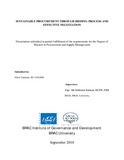Sustainable procurement through bidding process and effective negotiation

View/
Date
2018-09Publisher
BRAC UniversityAuthor
Talukdar, NilonMetadata
Show full item recordAbstract
Sustainable procurement practices integrate requirements, specifications and criteria that are
compatible and in favor of the protection of the environment, of social progress and in support of
economic development, namely by seeking resource efficiency, improving the quality of
products and services and ultimately optimizing costs.
Vital step in the development of sustainable procurement policies and plans is the establishment
of a cross departmental working group. This group will contribute to the developing and
implementing the sustainable procurement policy and action plan. The size of the group will
depend on human resource, structure, expert and resource available in the organization. The
group should include mix departmental expert who will ensure the plans for procuring the
product. If a large number of activities and analysis done by the mix departmental experts then
only the plan, strategy and implementation will be effective. Procurement expert, facility
managers, environment expert, legal expert, financial expert, IT expert, auditors, product
specification expert and other commercial officer will be included in the group.
Bidding document is required to be submitted to invite bid from the supplier. Bidding document
is the most important element for ensuring sustainable procurement as well as negotiation is a
very important part in procurement process. By this way buyer can reduce their overall
procurement cost.
Most of the organization of first world countries already ensured sustainable issues in bidding
document and effective negotiation but in our country, we cannot ensure sustainable issues. PPR
allows STD and negotiation. Moreover, most of the organizations have their own procurement
guidelines and their guidelines allow preparing bidding document and making negotiation. Why
we cannot ensure sustainable issues will be investigated in this study.
Mixed methods are deemed appropriate for the study. Both primary and secondary data have
been collected. Primary data have been collected from some government and non-government
organizations through questionnaire and secondary data have been collected through review of
website, books and case study. Since high level officials remain busy and they may not want to
disclose company’s information and operational level are not aware about the company’s
policies, mid-level officials have been chosen as respondents. A research questionnaire has been
prepared and sent to the officials of selected organization to get the information.
Most of the companies do not know about sustainable issues; therefore, expert on this area
should be hired or training secession may be arranged by hiring expert. As sustainable issues are
not included in the purchase policy therefore, sustainability criteria should be embedded in the
procurement policy for all organizations in Bangladesh. At the time inviting quotation/tender,
sustainability criteria should be included. Government should formulate rules and regulations
regarding sustainable issues that should be obeyed by all organizations in Bangladesh.
Finally, there is still huge scope to work on sustainable procurement. Most of the government
and non-government organizations in Bangladesh are not aware about sustainable procurement
where most of the first world countries have implemented the issues to create a better world.
More analysis is required to implement the issues in Bangladesh and how organization will be
benefited by sustainable procurement.
